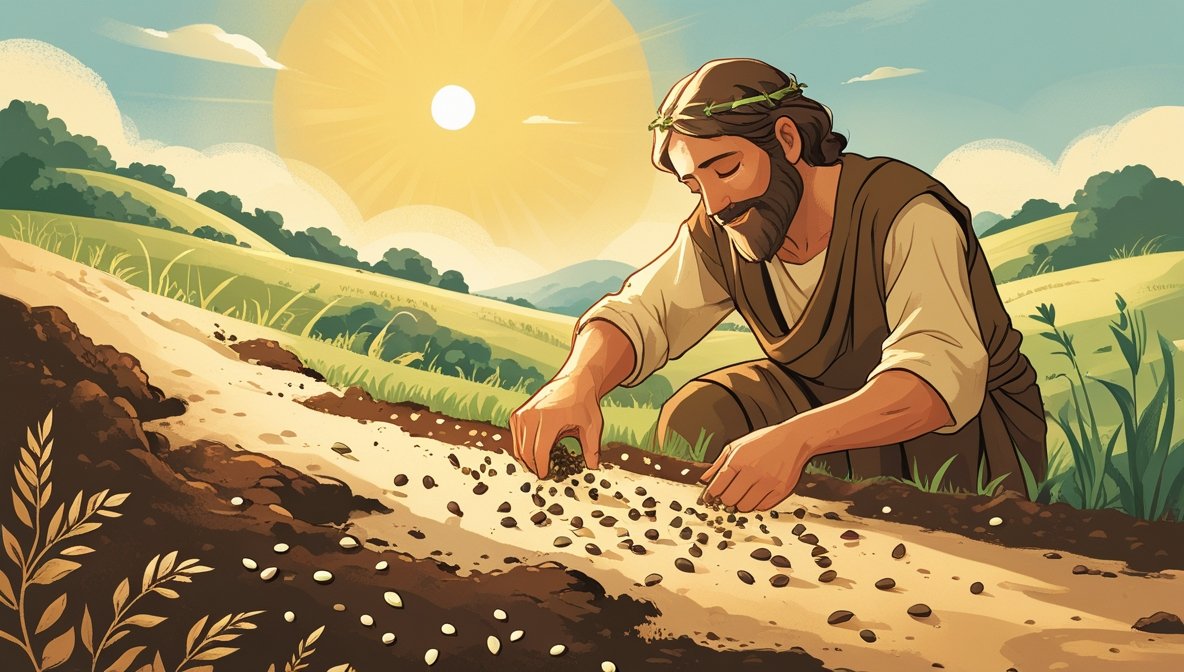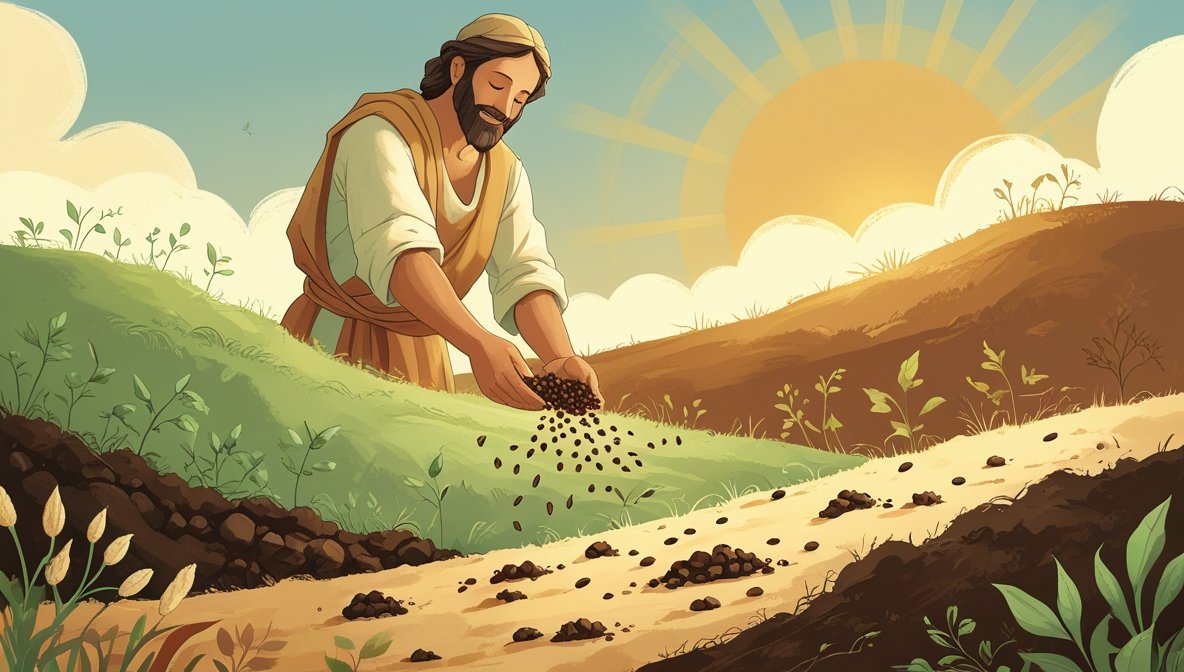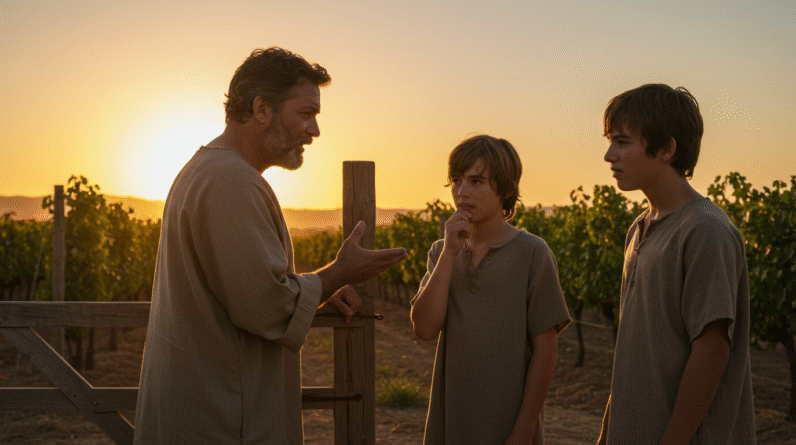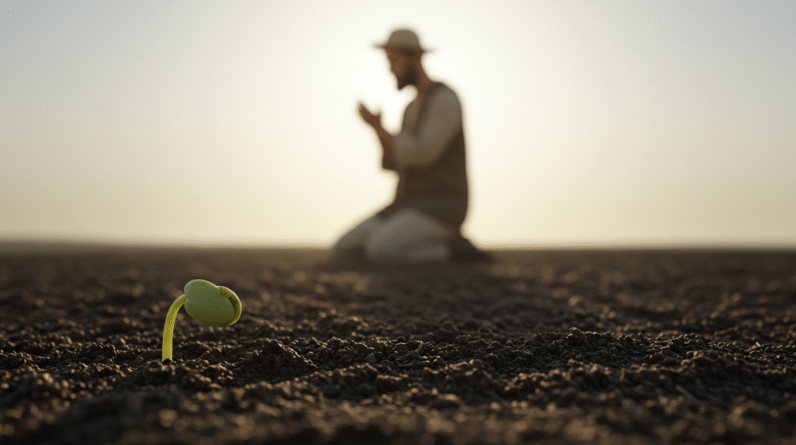The Parable Of The Sower Explained – How God’s Word Grows In Our Hearts
You’ve probably heard the Parable of the Sower a hundred times. It’s one of Jesus’ favorite teaching tools, and for good reason — it’s simple, memorable, and bursting with practical application. In this article you’ll get a clear, devotional-style breakdown of Matthew 13:1–23 that helps you understand not only what Jesus taught, but how his words take root (or don’t) in your heart. This is the Parable of the Sower explained in a way you can use week by week to grow spiritually.
You’ll read Scripture references, devotional reflections, and concrete steps you can take to become the kind of soil that produces a harvest. I’ll walk with you through each of the soils Jesus describes, then help you apply the lesson so God’s word actually grows in your life.
Why did Jesus use a parable
Jesus used parables because they invite you in. A parable is a spiritual picture painted with everyday images. When He told the Parable of the Sower, He used something everyone in his audience knew — sowing seed — to teach a spiritual reality about how people respond to God’s message. The story works because you can picture it: a farmer scattering seed, seed landing on different types of ground, and different outcomes depending on the soil. That same mental picture helps you evaluate your own heart.
If you want the whole account, read Matthew 13:1–23. You’ll notice Jesus first tells the story to the crowds and then explains it privately to His disciples. That’s important — the parable itself is clear enough to understand, but the deeper meaning is revealed by Jesus. Today, you’re getting both the story and the explanation so you can apply it.
The setting: a crowd, a boat, and a sower
Jesus sat by the lake and taught from a boat while the crowd stood on the shore. That detail matters because it shows Jesus intentionally used his setting to be both visible and audible. The parable comes from a real-life moment of ministry: people gathered, Jesus taught, and his listeners were expected to respond. In your life, the setting may be different — a church sermon, a Bible study, or a quiet morning reading — but the principle is the same: God speaks, and you decide how to listen.
When you read Matthew 13:1-2, you’ll see the crowd pressing in, eager for Jesus’ words. That eagerness is a model for you. If you come with curiosity and expectation, you’re more likely to receive. But coming to church or opening the Bible out of routine doesn’t guarantee growth. The Parable of the Sower explained helps you understand why.
The parable told: four types of soil
In the story, a sower scatters seed, and it falls on four different kinds of ground. Each type of soil represents a different response to the same seed — the seed being God’s word. The results vary dramatically because the soil differs. Jesus uses that image to show how the heart matters.
- Seed on the path: Birds come and eat it.
- Seed on rocky ground: It sprouts quickly but withers without roots.
- Seed among thorns: It grows but is choked by weeds.
- Seed on good soil: It yields a fruitful crop.
You’ll find this scene in Matthew 13:3-9. Each soil is an opportunity to examine your own life and ask, “What kind of ground am I?”
The seed: God’s word and its power
Before you can apply the parable, you need to know what the seed represents. Jesus tells his disciples that the seed is the message of the kingdom — God’s word. That’s the same life-giving truth that has the power to change you when it’s received and nurtured. This is the core of the Parable of the Sower explained: the outcome isn’t about the quality of the seed; it’s about the condition of the soil receiving it.
Consider Matthew 13:19, where Jesus defines the seed as the word that’s sown. The Bible elsewhere affirms the power of God’s word to transform you — for example, Isaiah 55:10-11 speaks of God’s word accomplishing what it intends. The responsibility lies with you: will you prepare the ground for God’s word, or will you let it be wasted?
Soil 1: The path — hearing without understanding
The first type of soil is the hard-packed path. Seed that falls there is immediately snatched by birds. Jesus explains that this represents people who hear the message but don’t understand it; the evil one snatches away what was sown in their hearts. You can read this in Matthew 13:19.
If you recognize yourself here, don’t despair. This condition often comes from distraction, skepticism, or a refusal to engage. You might be hearing truth from a distance — like sound from across a field — but it doesn’t penetrate. The cure is basic: invite understanding. Ask questions, seek clarification, and pray for eyes to see and ears to hear. Jesus prays for understanding — and he invites you to ask for it too.
When you’re honest, you’ll see that understanding often follows humility. The proud heart assumes it already knows; the humble heart says, “Show me.” Make room for the Holy Spirit to explain Scripture to you. If you’re in a Bible study or small group, tell someone you want clarification. If you’re alone, read Scripture with a study Bible or a trusted resource like Bible Gateway or Bible Hub to help illuminate the text.
Soil 2: Rocky ground — enthusiasm without depth
The second soil is rocky ground. There’s some soil on top, so the seed springs up quickly, but because the root can’t get deep, it withers when the sun scorches it. In Matthew 13:20-21, Jesus explains that this describes those who receive the word with joy but fall away when trouble or persecution comes.
You may have had dynamic spiritual experiences — an exciting conversion, a season of revival, or a powerful worship night. That initial enthusiasm was real. But if you didn’t build spiritual disciplines, your faith may have been more response than root. The rocky-ground heart needs depth.
Depth comes from practices that form the root system of your life: regular Bible reading, prayer, community, service, repentance, and obedience. You can’t fake depth. Real depth grows when you do the hard work of practicing spiritual disciplines on ordinary days. If you want to move from superficial enthusiasm to lasting faith, begin with a daily rhythm:
- Read the Word every day, even five minutes.
- Pray specifically — not just “help me,” but “help me to trust you in ______.”
- Get connected to a small group where you can be known.
The goal is not emotion but endurance. The Parable of the Sower explained shows you why endurance matters: when trials come, deep roots keep you steady.

Soil 3: Thorny ground — distraction and divided allegiance
The third soil is full of thorns. The seed grows but is choked by them. Jesus explains in Matthew 13:22 that the thorns are worries, riches, and pleasures that suffocate the word, making it unfruitful. This is a picture of divided priorities.
You might be spiritually busy but emotionally and mentally preoccupied with other things — career anxieties, financial stress, comfort-seeking, or the simple busyness of modern life. Those “thorns” seem harmless at first, but they grow fast and steal the life out of your spiritual walk. When your heart is divided, God’s priorities shrink.
The antidote is pruning. You have to remove the thorns deliberately. That might mean saying no to certain activities, reworking your schedule, creating financial safeguards, or confronting addictive habits. Pruning is painful, but it frees growth. Ask God to show you what’s choking your faith, and then take practical steps to remove it.
One practical move is margin: build blank space in your life where God can do work. Margin helps you slow down, pray, rest, and listen. Without margin, you’ll stay hurried, and hurried hearts don’t grow fruit.
Soil 4: Good soil — prepared hearts that produce
The fourth soil is the good soil. Seed that falls there produces a crop — thirty, sixty, even a hundredfold. In Matthew 13:23, Jesus describes this as those who hear the word, understand it, and produce fruit. This is the place you want to be: receptive, rooted, and fruitful.
Good soil doesn’t happen by accident. It’s the product of intentional preparation: repentance that softens the heart, spiritual practices that build depth, and pruning that removes distractions. The result is not only personal growth but multiplication. God’s word becomes a seed of blessing in your life and through you to others.
You produce fruit by living the gospel in everyday ways: loving your family, serving your neighbor, living with integrity at work, and sharing your faith. Fruitfulness also means perseverance: a life that continues to bear fruit through seasons of drought and plenty.
The teacher’s explanation: digging deeper into Matthew 13:18-23
After telling the story, Jesus explains it privately to his disciples in Matthew 13:18-23. As you study his explanation, notice two things. First, Jesus is pastoral — he wants you to know your state so you can change it. Second, he’s realistic — not everyone will respond the same way, but the invitation to become good soil is open to all.
When you read this passage slowly, ask God to reveal which soil best describes your current heart. Jesus’ explanation is not a judgment; it’s an invitation to repentance and growth. He’s not saying you’re stuck forever. The good news is that hearts can change. You can move from a path to good soil through intentional steps and God’s grace.
Cross-references: Mark and Luke expand the picture
The Parable of the Sower appears in the other Gospels too. Compare Mark 4:1–20 and Luke 8:4–15. Each account gives a slightly different emphasis that helps you see the full picture. Mark highlights the urgency and Jesus’ explanation, while Luke emphasizes hearing with understanding and persevering to produce fruit.
Reading all three accounts side by side helps you see the parable from multiple angles. The Parable of the Sower explained becomes richer when you let the Gospels speak together. This kind of comparative reading is a great study habit because it exposes more of Jesus’ intent and gives you a fuller roadmap for spiritual growth.
What keeps the seed from growing in your heart?
Now that you’ve considered the four soils, let’s diagnose common obstacles in your life that prevent God’s word from taking root. Most of the time, the problem isn’t doctrine. It’s condition — your heart’s readiness to receive and obey.
- Hardness: You might be closed off because of bitterness, skepticism, or unresolved hurt.
- Shallow roots: You may love the idea of faith without the cost of transformation.
- Thorns: You could be overwhelmed by anxiety, busyness, or the pursuit of comfort.
- Neglect: Maybe you simply haven’t cultivated spiritual practices.
Each obstacle has a spiritual remedy. Bitterness needs confession and forgiveness. Shallow roots need discipline. Thorns need pruning. Neglect needs routine and accountability. The Parable of the Sower explained is practical — it tells you how to treat each condition.
How to become good soil: five practical steps
Becoming good soil is a process; it’s not an overnight miracle. If you’re serious about growth, start with practical, measurable steps. The following five actions will help you prepare your heart for God’s word and produce lasting fruit.
- Repent and receive: Clear away resistance by confessing sin and reclaiming your dependence on Christ. Repentance softens the soil.
- Build daily rhythms: Create a simple daily plan for Bible reading and prayer — even ten minutes matters.
- Join a community: Spiritual growth is communal. Get into a small group where you can be known and held accountable.
- Serve regularly: Put your faith into practice by serving others. Fruitfulness is often born in service.
- Create margin and prune: Schedule rest and remove what chokes your spiritual life.
Each of these steps is practical and repeatable. Don’t try to do everything at once. Start where you are and be consistent. Remember, the Parable of the Sower explained shows that growth is multipliteral — small, faithful steps compound into a harvest.
Spiritual disciplines that deepen roots
If rocky ground is your problem, deepen your roots through intentional practice. These spiritual disciplines anchor your heart so you don’t wither when hardship comes.
- Scripture meditation: Read a short passage and meditate on it throughout the day.
- Prayer of confession: Daily confession refreshes your relationship with God.
- Worship: Regular worship reshapes your affections toward God.
- Fasting: Periodic fasting sharpens spiritual sensitivity and reliance on God.
- Service: Active love for others forms spiritual maturity.
Depth grows through repetition. You’re not looking for a one-time experience; you’re building lifelong habits. Rick Warren often says that habits form character. The same is true spiritually: the practices you repeat become the roots that sustain you.

Guarding your heart from thorns
To remove the thorns in your life, you’ll need to be both honest and strategic. Start by identifying the biggest distractors: What occupies your mind when you should be praying? What takes the lion’s share of your time and energy? What comforts do you chase to avoid God?
Once you identify the thorns, act. Set boundaries with technology, simplify your schedule, create financial plans, and confess compulsive behaviors to a trusted friend or pastor. Pruning requires discipline, but the reward is a freer, more fruitful life.
Remember Proverbs’ wisdom: guard your heart, for everything you do flows from it. Practical guarding means saying some strategic “no” so you can focus on the faithful “yes” to God.
The role of understanding and obedience
Jesus links hearing with understanding and obedience. In Luke 8:18, He warns you to be careful how you listen — because hearing without doing leads to judgment. Similarly, James 1:22 urges you to be doers of the word, not hearers only.
Understanding is not merely intellectual assent. It’s a heart posture that leads to action. When you grasp God’s Word, the natural next step is to obey it. Obedience deepens fruitfulness because it proves your reception is authentic. If you’re asking what to do after hearing a sermon or reading Scripture, start with one application and act on it immediately.
The Parable of the Sower explained that the true test of reception is fruit. You can know the truth and still be unproductive if you don’t live it. So practice obedience in the small things: kindness, truth-telling, sacrificial generosity. Those small acts are the first shoots of a full harvest.
The promise and responsibility of the gospel
While the parable paints a realistic picture of varied responses, it also carries a hopeful promise. God’s word is powerful, and when it finds good soil, it multiplies abundantly. Psalm 1:3 describes the blessed person as like a tree planted by streams of water, yielding fruit in season. That’s the life Jesus invites you into.
Your responsibility is to prepare and maintain the soil of your heart. God’s role is to grow the seed and bring the increase. You cooperate with God by being faithful with the means of grace — prayer, Scripture, worship, fellowship, and service. When you do your part, God does His. The Parable of the Sower explained is a call to partnership with God in the work of spiritual growth.
How to evaluate your spiritual soil regularly
Spiritual self-assessment is not about self-condemnation; it’s about honest stewardship. Once a month, take time to evaluate your soil: Are you soft or hard? Rooted or shallow? Choked or free? Fruitful or barren?
Ask these questions:
- What in my life is growing?
- What is dying where I expected fruit?
- What thorns need pruning?
- What habits need starting or stopping?
Write your answers down and make a simple plan for the next 30 days. Accountability helps. Share your plan with a friend or pastor and ask them to check in. Growth without accountability tends to stagnate. The Parable of the Sower explained is not just an explanation — it’s an ongoing practice.
Practical habits to cultivate daily
Here are some small, daily habits that consistently produce good soil:
- Begin with five minutes of prayer asking God to prepare your heart.
- Read one passage of Scripture and ask, “What is one thing God wants me to do today?”
- Serve someone intentionally — even a simple act can train generosity.
- End your day with a brief reflection: where did you see God work today?
These habits are small but transformative. They form an ecosystem in which the seed of God’s Word thrives. If you’re overwhelmed, pick one habit and make it non-negotiable for 30 days. You’ll be surprised at how small disciplines compound over time.
Teaching others: reproducing good soil
Fruitfulness is contagious. When your life bears fruit, you naturally become a sower of God’s word in other people’s lives. You teach by example and by intentional discipleship. Ask yourself: who am I investing in? Who is watching how I live? Discipleship is the next step of fruitfulness — it multiplies the harvest.
Jesus’ mission was multiplication — making disciples who make disciples. The Parable of the Sower explained is not just personal; it’s communal. Your growth is meant to overflow into others’ lives. Start with one person you can invest in consistently. Share what you’re learning, invite them into your routines, and pray for their soil to be prepared.
Common misconceptions clarified
A few mistaken ideas often get in the way of understanding this parable.
- Misconception: “If I don’t see immediate fruit, I’m a failure.” Reality: Growth takes time and seasons. Patience is a spiritual discipline.
- Misconception: “The seed’s quality determines the outcome.” Reality: The seed is always the same — the condition of the soil makes the difference.
- Misconception: “Only dramatic experiences prove growth.” Reality: Steady obedience in ordinary life produces lasting fruit.
Correcting these misconceptions helps you set realistic expectations and avoid discouragement. The Parable of the Sower explained reminds you that God’s work is often slow but sure.
Prayer to prepare your soil
If you want a simple prayer to prepare your heart, try this: “Lord, soften my heart where it’s hard. Remove the rocks that keep me shallow. Wind up the thorns that choke my time and attention. Give me good soil so your word will grow and bear fruit. Help me to hear, to understand, and to obey. Amen.”
Pray that prayer often. Then follow it with action. God’s grace meets your effort. The Parable of the Sower explained is both a reassurance and a challenge: God will grow the seed, but you must prepare the ground.
Final encouragement: keep tending your heart
Becoming good soil is a lifetime project. Expect setbacks, but don’t be discouraged. Remember that God’s goal is not just a moral fix but a transformed life that reflects Christ. When you tend your heart — through repentance, discipline, community, and service — you’re partnering with God to produce a harvest that changes you and the world around you.
If you want further study, read the parallel accounts in Mark 4:1–20 and Luke 8:4–15. Compare them and pray for insight. The more you study, the more the Parable of the Sower will come alive in your daily walk with Jesus.
Explore More
For further reading and encouragement, check out these posts:
👉 7 Bible Verses About Faith in Hard Times
👉 Job’s Faith: What We Can Learn From His Trials
👉 How To Trust God When Everything Falls Apart
👉 Why God Allows Suffering – A Biblical Perspective
👉 Faith Over Fear: How To Stand Strong In Uncertain Seasons
👉 How To Encourage Someone Struggling With Their Faith
👉 5 Prayers for Strength When You’re Feeling Weak

📘 Jesus and the Woman Caught in Adultery – Grace and Mercy Over Judgement
A powerful retelling of John 8:1-11. This book brings to life the depth of forgiveness, mercy, and God’s unwavering love.
👉 Check it now on Amazon
As a ClickBank Affiliate, I earn from qualifying purchases.
Acknowledgment: All Bible verses referenced in this article were accessed via Bible Gateway (or Bible Hub).
“Want to explore more? Check out our latest post on Why Jesus? and discover the life-changing truth of the Gospel!”







